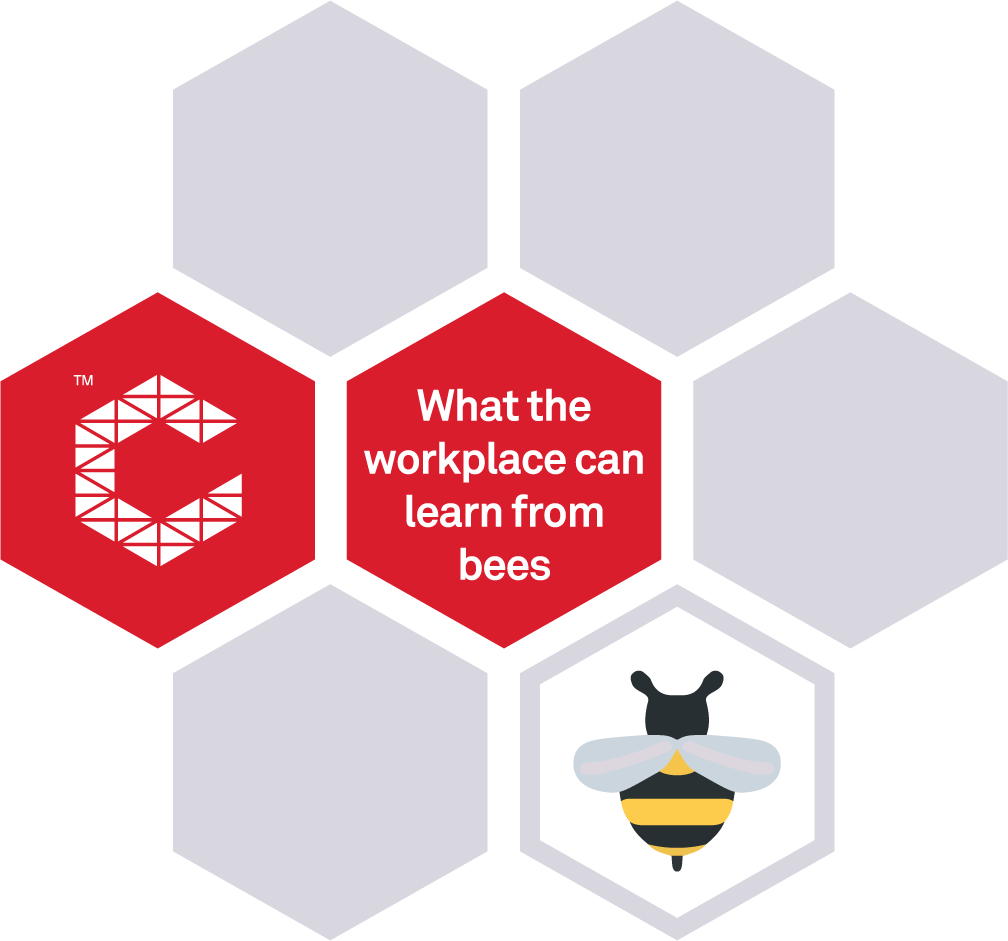|

If the success of programmes such as Blue Planet are anything to go by, it’s evident that we are fascinated by animals’ complex yet structured approach to survival. Some still believe that business is ‘survival of the fittest’ but certain species are showing us that actually survival depends on something else: leadership.
Whilst some may think this is a case of anthropomorphism, there is a tremendous amount of research that has confirmed that bees, in particular, are exceptionally intelligent, and that each bee has an extremely important role in ensuring the success of the hive. So how does this apply to the workplace?
Creatif believes that people deserve the best environments for wellness, productivity and interaction at work. We decided to investigate what the workplace can learn from bees and how they cleverly manipulate their environment to suit their needs.
Determination:
Did you know that honey bees gather nectar from two million flowers and travel over 90,000 miles (the equivalent to three times around the earth) to make one pound of honey? If people continuously, with minimum distraction, stay focused on their objectives then they too could be as industrious as bees.
Efficiency:
There are over 10 documented different bee ‘roles’ within a hive: the Queen bee, worker bees, foragers, cleaners, drones, undertakers, builders, temperature controllers and guards. Compare the similarities with a standard business model and you have a CEO, HR team, senior staff, administration assistants and maintenance teams among others. Each person should have a clear objective to be capable of contributing their skill set, without overlap, unless required by the business.
Community:
Whilst gathering pollen, bees also pollinate along the way, and thus the cycle of life continues. Transfer this to workers bees, and it can sometimes be quite insular – people should be encouraged to reach out to other departments to share skills, or offer their knowledge and skillset to a local charity once a year – ideally for free or at a considerably reduced fee.
Flexibility:
Bees adapt to their environment. If the temperature spikes or dips, bees are flexible in their ability to relocate to more suitable environments. Humans are resistant to change, which stifles their productivity. A more flexible attitude would reduce the impact on employee wellbeing. Creatif’s Adaptif range focuses on multi-functional, flexible furniture that can adapt to ever-changing business needs, making the transition that much easier.
Leadership:
The queen bee performs her tasks and trusts her colony to get on with their individual duties. In essence, she doesn’t micro-manage. Each member of the colony can be left to work autonomously and with purpose, but knows there is a clear chain of command. A Harvard Business Review survey revealed 58% of people say they trust strangers more than their own boss. When employees feel inspired, empowered and trusted, they are more likely to trust the leadership team.
|
Teamwork:
The diversity of bees is what makes the hive flourish. A colony of queen bees wouldn’t survive, nor would a swam of drone bees. It is the combination of each and every individual bee’s skill set coming together in harmony that continues the bees’ survival. Creatif prides itself on supporting each other across the business so that the quality of a product is never compromised, nor a delivery scheduled delayed unnecessarily. Click here for more information about the team behind Creatif.

Communication:
Whilst collaboration might seem like a buzzword, it is the foundation upon which every successful business relies. Bees conduct a figure-of-eight ‘waggle dance’ that provides insight as to where the best resources lie. A recent article states that a feedback loop is integral to effective employee communication - confusion or resentment on the part of the receiver makes a message ineffective. When designing furniture to enhance employee communication, Creatif’s Acoustif range offers acoustic, attractive and cost effective solutions to encourage private conversations to stay private and prevent noise pollution from affecting other people.

Quality:
In order to make perfect honey, the moisture content needs to be 17% water. Bees consistently produce high-calibre honey as a team. One bee can impact the whole hive. Employee wellness is known to improve when they feel part of a team, and when the team is performing well, so if every person adheres to high standards and self-discipline, then the team won’t be compromising on quality. When it comes to Creatif’s environmental policy, quality is at the heart of every stitch and staple, with policies that include re-using leftover materials, recycling waste, low energy lighting and low nuisance noise management.
Environment:
In Professor Brian Cox’s book ‘Forces of Nature’ he states that there is a ‘less accomplished’ Mexican bee that constructs cylindrical cells instead of the hexagonal combs we’re all familiar with. What’s fascinating is that honey bees purposefully create hexagons as this is the most economical way honey can be stored. In an experiment coloured dye was added to a hive. Bumble bees first created a cylindrical shape that they then modified to form a hexagon. Hexagons maximise space without wasting valuable wax; for every gram of wax a bee produces, it has to consume up to eight grams of honey. This demonstrated that bees know how to efficiently adapt their architecture.
Just like the bees, Creatif specialises in creating spaces that are ideally adapted to its environment. Whether it’s the Adaptif, Acoustif, Effectif or Seclusif range, Creatif leads the way in producing expertly designed office furniture that promotes wellness, productivity and interaction at work.
For further inspiration, read the 5 spaces for business success and the summary from the ‘Sound… it’s all around you” seminar to gain an insight into optimal office acoustics.
|


